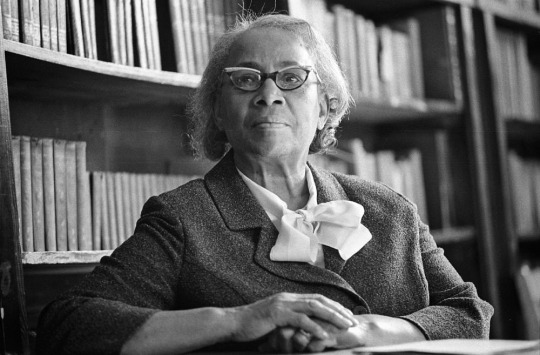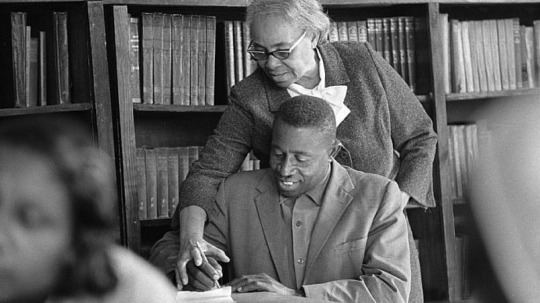#septima clark
Text

131 notes
·
View notes
Text

Today In History
Septima Poinsette Clark a teacher and civil rights activist, was born on this date May 3, 1898.
As part of the Southern Christian Leadership Conference, Clark set up citizenship schools that helped many African Americans register to vote. She received the “Living Legacy Award” from President Jimmy Carter.
CARTER™️ Magazine
#septima Clark#carter magazine#historyandhiphop365#wherehistoryandhiphopmeet#carter#history#cartermagazine#today in history#staywoke#blackhistory#blackhistorymonth
36 notes
·
View notes
Quote
Septima Poinsette Clark pioneered the link between education and political organizing, especially political organizing aimed at gaining the right to vote. “Literacy means liberation,” she stressed knowing that education was key to gaining political, economic, and social power.
SNCC Digital Gateway. Septima Clark
Thread at Twitter.
8 notes
·
View notes
Text

Septima Poinsette Clark a teacher and civil rights activist, was born on May 3, 1898.
32 notes
·
View notes
Text
“We need to be taught to study rather than believe, to inquire rather than to affirm”
Septima Poinsette Clark
13 notes
·
View notes
Text

Septima Poinsette Clark by Allison Adams
“I believe unconditionally in the ability of people to respond when they are told the truth. We need to be taught to study rather than believe, to inquire rather than to affirm.”
Septima Poinsette Clark (1893-1987) was an African-American teacher and civil rights activist who set up citizenship schools for disenfranchised African Americans in the 1950s and 60s. Here, they were taught to read and write so they could pass the literacy tests required by southern states to register to vote. The citizenship schools began to spread through the south, and were adopted by Martin Luther King Jr’s Southern Christian Leadership Conference in 1961. As a result, many began to take control of their lives and discover their full rights as citizens. Septima’s 40 years of teaching experience and her own struggles and triumphs of finding work as a black teacher in the south equipped her to design an education program that changed the course of history and empowered many African Americans to take control of their lives and discover their full rights as citizens. She became known as the “Queen mother” or “Grandmother” of the Civil Rights Movement in the United States.
#Septima Poinsette Clark#Allison adams#civil rights#herstory#black history#activists#art#artwork#portrait#female portrait#women in history#civil rights movement#irl women/girls
2 notes
·
View notes
Text
starter for: anyone (CLOSED)
location: septima poinsette clark library
Valentina had been spending a lot of time at the library lately, looking up rules and regulations around opening a business, town records, business best practices, and more. Making herself comfortable in one of the large chairs, she quickly became so engrossed in her current read, she hadn’t noticed when someone took the chair beside hers.
She did notice, however, when suddenly a couple somewhere behind her, started screaming at each other over the spoiled milk the woman had found in the fridge that morning. Cringing, Val instantly shrunk back into her seat, in an attempt to simply disappear. Her eyes moved up to the person she now realized occupied the seat beside her, checking if they were hearing what she was too. “How many times do you think Harv over there has put spoiled milk back in the fridge before?” she asked in a whisper.

#briar ridge: starter#i'm so excited to get started guys! feel free to assume connections! val has lived in town for about 5 or 6 years now
19 notes
·
View notes
Text
SEPTIMA POINSETTE CLARK // ACTIVIST
“She was an African American educator and civil rights activist. Clark developed the literacy and citizenship workshops that played an important role in the drive for voting rights and civil rights for African Americans. Her work was commonly underappreciated by Southern male activists. She became known as the “Queen mother” or “Grandmother” of the Civil Rights Movement.”


9 notes
·
View notes
Text

"I'm not going to be the teacher. We're going to learn together. You're going to teach me some things, and maybe there are a few things I might be able to teach you, but I don't consider myself a teacher. I just feel that I'm here to learn with you. We'll learn things together."
As an adult educator myself, I couldn't help but be drawn into the fascinating life and philosophies of Bernice Violanthe Robinson. Born February 7, 1914 in Charleston, South Carolina --a day that saw snowfall in Charleston for the first time in more than a century. Robinson's mother, Martha Elizabeth (née Anderson) Robinson took this as a sign that her daughter would spend her life "disturbing the elements." Martha was herself sister to Septima Poinsette Clark's mother (see Lesson #74 in this series), and Bernice's own principles would similarly coalesce around the twin premises of education and citizenship, much like her famous cousin.
In 1929 Bernice moved from South Carolina to Harlem, New York with the intention of becoming a musician, but after a period in the famed garment district, her talents as a seamstress took prominence and she graduated from Poro School of Cosmetology. In 1947 she returned to Johns Island, South Carolina to care for her ageing parents, and with her professional talents was able to open her own salon --a form of economic independence not available to Black women in most other careers. At the time beauticians were traditionally well-regarded amongst civil rights workers, not only because they were known and respected in a community, but also because of their almost-stereotypical role as "the good listeners," and that as self-employed entrepreneurs were less prone to backlash from punitive employers. By all accounts a socially engaging and affable personality with an easy talent for friendly first impressions, Bernice joined the NAACP and made good use of her salon as a "hub" for local activism, and made many contacts and acquaintances.
In 1956 Robinson attended a workshop hosted by the Highlander Folk School (an organization that itself certainly merits its own course of study); her cousin Septima Clark also attended. Ostensibly the topic was about desegregation but over the course of the session the focus turned to civic literacy and educating would-be voters. Bernice expressed an interest in helping to better educate the people of Johns Island but lamented her lack of professional teaching credentials. Clark countered by suggesting that her cousin was the ideal candidate for such a role precisely because she lacked such a credential; that she was perfectly suited to the task because of her lack of formal training --no preconceived notions.
Thusly "voluntold," Bernice threw herself into her new calling; in five months (!) she developed lesson plans, curricula, and distributable materials that would lead to SCLC voter-registration workshops in communities well beyond Johns Island; eventually catching on in Charleston itself. The growth of these first Citizenship Schools in turn fed into the enthusiasm and the missions of CORE, the Freedom Riders, and the SNCC --all of which reinforced one another as they continued to educate and motivate scores of citizens who had never before stepped into a voting booth.
As an adult educator, Bernice also adhered to the principle of never stopping learning: in 1967 she completed a University of Wisconsin correspondence course in community development, and also found time to secure an additional degree in interior design. Robinson stepped down from her behind-the-scenes SCLC role in 1970, having quietly developed what amounted to the most successful and widespread literacy campaign in modern American history. She pivoted to developing curricula for the South Carolina Commission for Farm Workers (SCCFW); and then in 1972 --in what I can only assume is the inherent desire of the adult educator to yet again try something new and different-- she ran for Congress.
#black lives matter#black history month#adult education#lifelong learning#bernice robinson#highlander folk school#teachtruth#dothework#sclc
50 notes
·
View notes
Text
Who: @papaflynn
Where: Septima Poinsette Clark Library
Lily was browsing the new to the library shelf, slowly walking around the four walled shelf reading all the titles and taking a book to read the summary when it caught her attention. Just as Lily was reaching for one book that looked interesting another hand reached out and their hands collided. Her hand shot back instantly. Sorry. She signed and looked up at the man watching his lips as she gestured for him to go ahead and take the book if he wanted.

2 notes
·
View notes
Text

Today In History
Septima Poinsette Clark a teacher and civil rights activist, was born on this date May 3, 1898.
As part of the Southern Christian Leadership Conference, Clark set up citizenship schools that helped many African Americans register to vote. She received the “Living Legacy Award” from President Jimmy Carter.
CARTER™️ Magazine carter-mag.com #wherehistoryandhiphopmeet #historyandhiphop365 #cartermagazine #carter #staywoke #septimaclark #blackhistorymonth #blackhistory
#carter magazine#carter#historyandhiphop365#wherehistoryandhiphopmeet#history#cartermagazine#today in history#staywoke#blackhistory#blackhistorymonth
26 notes
·
View notes
Text
CLOSED starter for ( @theawaldrof ) at SEPTIMA POINSETTE CLARK LIBRARY, just after NOON.
Storytime at the library meant Alex could safely trust Emmy in someone else's care for a time, seated only a few feet away in front of him, while he was stationed behind his laptop at a nearby table, and the storyteller had captured his daughter's attention. Every so often, the toddler would twist in her seat, face her father, and giggle — and he tried to ignore the nagging concern that she was checking to make sure he was still there.
He'd just adjusted in his seat when the telltale sound of falling books averted his attention from the screen in front of him. Bending at the waist without thinking, he plucked a fallen book from the floor where it landed a few feet away from him to hand it to the unlucky person and... came face-to-face with Thea Waldrof.
Shit.
"Um, hi?"

3 notes
·
View notes
Text
starter for: @henryxmonroe
location: septima poinsette clark library
One of the unexpected perks of moving to Briar Ridge was definitely how active the deaf community was in the town. There was always at least one monthly event and lots of volunteering opportunities. With planning for the yoga studio in full swing, Val had been incredibly busy lately, but her schedule finally matched up and she was able to attend an ASL reading event at the local library. With a bit of a pep in her step, Val walked into the library and after greeting some of her friends who she had gotten to know from past events, she headed over towards the organizer to ask where she could help. The woman signed that Val would be paired up with someone who would be reading a book out loud to a group of kids and Val would then translate into ASL. Val nodded emphatically before asking who she should pair up with. The woman checked her spreadsheet and found that there was only one other volunteer left and pointed towards the back of the room. Val headed in that direction, only to stop dead in her tracks when she spotted just who the lady meant. "Henry??" she hadn't even meant to say his name out loud, but the shock of seeing him after all this time had so completely caught her off guard.

9 notes
·
View notes
Photo

Great price on this 2020-P South Carolina American Innovation Dollar ONLY: $3.00 2020-P South Carolina American Innovation DollarThe American Innovation $1 Coin representing South Carolina honors educator and civil rights activist Septima Poinsette Clark. https://www.thecoinshop.shop/american-innovation-dollars/2020-p-south-carolina-american-innovation-dollar View MORE American Innovation Dollars https://www.thecoinshop.shop/american-innovation-dollars
2 notes
·
View notes
Text
Embracing Our Heritage: The Journey of Black Women in America and Our Right to Luxury
The history of Black women in America is a narrative rich in resilience, strength, and unyielding spirit. From the brutal realities of slavery to the complexities of contemporary systemic oppression, Black women have endured and thrived against overwhelming odds. This article seeks to provide a scholarly exploration of this history, emphasizing the necessity for reparations—not merely as financial compensation but as a holistic restoration of dignity, equity, and luxury.
The Early Struggles: Slavery and Survival
Black women’s journey in America began under the harshest conditions imaginable. Arriving as enslaved individuals, they were subjected to brutal physical labor, sexual exploitation, and family separations. Despite these dehumanizing conditions, enslaved Black women created covert networks of support and resistance. They preserved African cultural traditions through oral histories, religious practices, and communal care, thereby maintaining a sense of identity and solidarity.
Scholars like Deborah Gray White in "Ar’n’t I a Woman?: Female Slaves in the Plantation South" have documented the unique challenges faced by enslaved women. Their dual burden of race and gender placed them in a precarious position, yet they played crucial roles in the survival and resistance of their communities.
Reconstruction and the Fight for Freedom
The Reconstruction era (1865-1877) presented both opportunities and significant challenges for Black women. Although legally freed, they encountered pervasive racial hostility and economic instability. Reconstruction policies often failed to protect Black women from violence and exploitation.
Historians such as Elsa Barkley Brown have highlighted the active roles Black women took in shaping the post-emancipation landscape. They were instrumental in establishing schools, churches, and civic organizations. Despite limited resources and relentless opposition, figures like Mary McLeod Bethune emerged, advocating for education and social upliftment.
Jim Crow Era: Resilience in the Face of Racism
The Jim Crow era (late 19th century to mid-20th century) entrenched systemic racism through segregation laws and practices. Black women were confined to low-wage jobs, often as domestic workers, and were subjected to severe social and economic disenfranchisement.
Despite these oppressive conditions, Black women fostered communities of resistance and self-help. The rise of organizations like the National Association of Colored Women (NACW) exemplified their commitment to social justice and community improvement. Scholars like Darlene Clark Hine have documented how these organizations provided crucial support and advocacy, challenging the pervasive racism of the era.
Civil Rights Movement: The Unseen Architects
The Civil Rights Movement of the 1950s and 1960s is often characterized by its male leaders, yet Black women were the backbone of this transformative period. Activists such as Ella Baker, Septima Clark, and Diane Nash played pivotal roles in organizing, strategizing, and mobilizing communities.
Their contributions extended beyond frontline activism. Black women were essential in grassroots organizing, voter registration drives, and educational initiatives. Historian Barbara Ransby’s work on Ella Baker underscores the importance of Black women’s leadership in sustaining the movement’s momentum and achieving its successes.
Modern Struggles: From Poverty to the Prison Pipeline
In contemporary America, Black women continue to navigate systemic inequities. They are disproportionately affected by poverty, health disparities, and mass incarceration. The school-to-prison pipeline, a term coined to describe the policies and practices that push students, particularly those of color, from schools into the criminal justice system, disproportionately impacts Black girls.
Angela Davis’s scholarship highlights the intersections of race, gender, and incarceration, emphasizing the need for comprehensive reforms. Black women’s overrepresentation in low-wage work, coupled with systemic barriers to education and healthcare, perpetuates cycles of disadvantage.
The Case for Reparations: A Right, Not a Privilege
The call for reparations for Black women extends beyond monetary compensation. It encompasses a holistic approach to addressing historical injustices and systemic inequities. Reparations should include educational opportunities, healthcare access, housing, and investment in Black communities.
Ta-Nehisi Coates’s landmark essay "The Case for Reparations" argues for a multi-faceted approach to rectifying the enduring legacy of slavery and segregation. For Black women, reparations would acknowledge the compounded effects of racial and gender discrimination, providing a foundation for equitable advancement.
Living in Luxury: A New Standard
Reparations should enable Black women to live in environments that promote their well-being and security. This includes access to safe and thriving neighborhoods, quality education, and healthcare that addresses their specific needs. The concept of luxury, in this context, is redefined as the right to live without the constant burden of systemic oppression and economic instability.
The history of Black women in America is a testament to enduring strength and relentless pursuit of justice. From the brutalities of slavery to the ongoing struggles against systemic inequities, Black women have consistently demonstrated resilience and leadership. The call for reparations is not a plea for charity but a demand for justice—a recognition of the invaluable contributions Black women have made and continue to make to society. It’s time for Black women to reclaim their right to luxury and equity, ensuring that future generations can inherit a legacy of dignity and prosperity.
This perspective aligns with the scholarship of sociologist Patricia Hill Collins, who emphasizes the importance of intersectionality in understanding Black women’s experiences. By addressing these intersecting oppressions, reparations can foster environments where Black women not only survive but thrive.
Conclusion
The history of Black women in America is a testament to enduring strength and relentless pursuit of justice. From the brutalities of slavery to the ongoing struggles against systemic inequities, Black women have consistently demonstrated resilience and leadership. The call for reparations is not a plea for charity but a demand for justice—a recognition of the invaluable contributions Black women have made and continue to make to society. It’s time for Black women to reclaim their right to luxury and equity, ensuring that future generations can inherit a legacy of dignity and prosperity.



#Black women in America#black stories#spilled thoughts#Black women's resilience#Black women's struggles#Reparations for Black women#Black women and systemic oppression#luxury#blackwomen in luxury
0 notes
